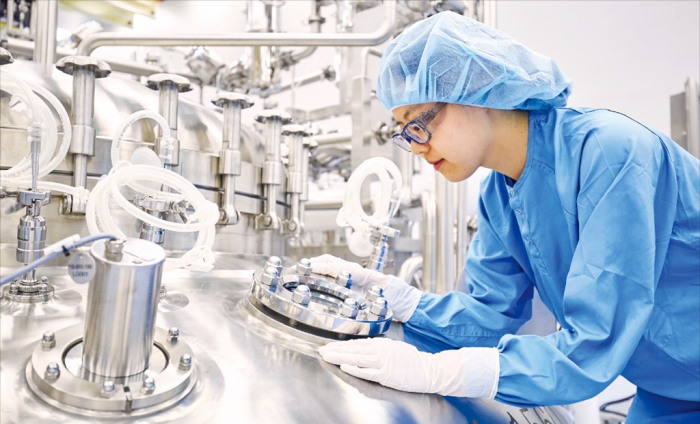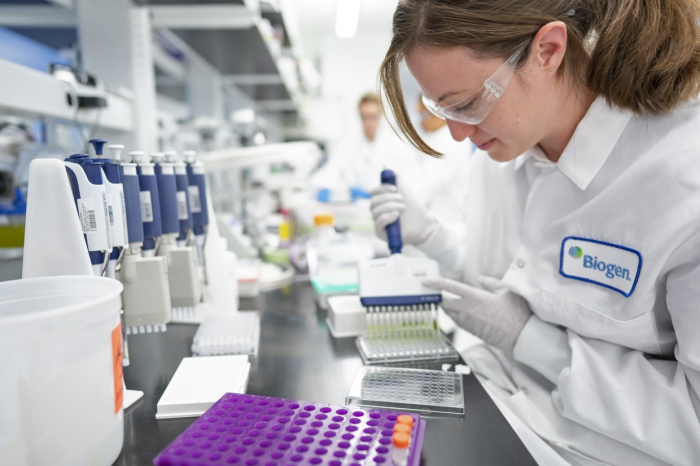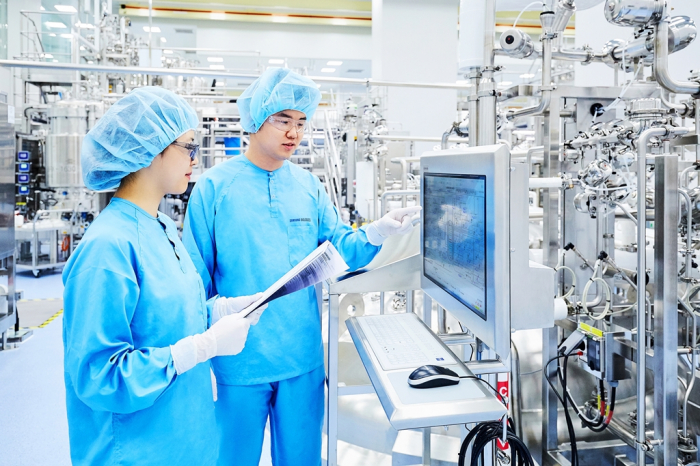Pharmaceuticals
Samsung Bioepis posts $1.26 billion in global biosimilar sales
Samsung’s sales will continue to rise this year with more biosimilars in the pipeline
By Feb 18, 2022 (Gmt+09:00)
2
Min read
Most Read
LG Chem to sell water filter business to Glenwood PE for $692 million


KT&G eyes overseas M&A after rejecting activist fund's offer


Kyobo Life poised to buy Japan’s SBI Group-owned savings bank


StockX in merger talks with Naver’s online reseller Kream


Meritz backs half of ex-manager’s $210 mn hedge fund



Samsung Bioepis Co., a biopharmaceutical unit of Samsung Group, said on Friday that sales of its five biosimilar products in global markets, excluding South Korea, reached $1.26 billion in 2021, up 11% from the previous year.
In 2020, global sales of the company’s five biosimilars – three in the autoimmune sector, which are Infliximab, Etanercept, Adalimumab; and two others, Trastuzumab and Bevacizumab, in oncology – stood at $1.13 billion.
Samsung compiled the data from the annual earnings recently reported by its two US-based global sales partners, Biogen Inc. and Organon & Co.
Under contracts, Biogen holds exclusive rights to sell the Korean company’s three autoimmune disease biosimilars in Europe, while Organon owns such rights for the three in other parts of the world. Organon also has the sales rights for the two oncology biosimilars globally.
While Biogen sold 990 billion, or about $828 million, worth of Samsung’s biosimilars last year, Organon’s sales of the five biosimilars reached 505 billion won, according to Samsung Bioepis.
The two US companies almost evenly split their sales revenues from the five biosimilar products with Samsung.
The Korean biosimilar maker said its total sales last year reached 850 billion won, a 10% increase from the previous year.

END TO BIOSIMILAR JV
Samsung Biepis is a joint venture between Samsung Group’s biotech arm Samsung Biologics Co. and the US biopharmaceutical firm Biogen.
Last month, Biogen said it is selling its entire stake in the JV, amounting to a 50% stake minus one share, to Samsung Biologics for $2.3 billion, ending their decade-long partnership.
Under the terms of the agreement, Samsung will pay Biogen $1 billion by the end of April, and the remaining amount in installments over the next two years
Samsung said its full ownership of the JV will take effect when its first payment of $1 billion is made.
Even after the end of the JV, Samsung and Biogen will continue to work closely, according to officials of the two companies.

MORE BIOSIMILARS IN PIPELINE
Industry officials said Samsung Bioepis’ sales will likely rise to nearly 1 trillion won this year, helped by Byooviz, a biosimilar referencing Lucentis for the treatment of macular degeneration.
Samsung obtained sales approval for Byooviz, codenamed SB11, from the European authorities in August 2021 and from the US Food and Drug Administration in September.
Byooviz is an anti-vascular endothelial growth factor (VEGF) treatment that can prevent the loss of eyesight in people suffering from retinal vascular disorders that can lead to irreversible blindness or visual impairment in adults.
Samsung is also developing SB15, a biosimilar of Bayer and Regeneron’s ophthalmic disease treatment Eylea, which is currently in phase 3 clinical trials. Eylea’s global revenue is about double that of Lucentis.
Biosimilars are products that have been demonstrated to be similar in efficacy and safety to the originator’s reference product, with the advantage that they are less expensive and promote sustainable access to therapies.
Write to Ju-Hyun Lee at deep@hankyung.com
In-Soo Nam edited this article.
More to Read
-
 M&AsSamsung buys $2.3 bn Bioepis stake from Biogen to end partnership
M&AsSamsung buys $2.3 bn Bioepis stake from Biogen to end partnershipJan 28, 2022 (Gmt+09:00)
3 Min read -
 BiosimilarsSamsung Bioepis gets FDA approval for Lucentis biosimilar Byooviz
BiosimilarsSamsung Bioepis gets FDA approval for Lucentis biosimilar ByoovizSep 23, 2021 (Gmt+09:00)
3 Min read -
 BiosimilarsSamsung Bioepis gets nod for sale of ophthalmology biosimilar in Europe
BiosimilarsSamsung Bioepis gets nod for sale of ophthalmology biosimilar in EuropeAug 23, 2021 (Gmt+09:00)
1 Min read -
 BiosimilarsCelltrion, Samsung Bioepis anticipate increased biosimilar sales in Europe
BiosimilarsCelltrion, Samsung Bioepis anticipate increased biosimilar sales in EuropeJul 12, 2021 (Gmt+09:00)
1 Min read -
 COVID vaccinesKorean pharmas may turn into global vaccine makers on Biden remarks
COVID vaccinesKorean pharmas may turn into global vaccine makers on Biden remarksMay 07, 2021 (Gmt+09:00)
4 Min read
Comment 0
LOG IN


